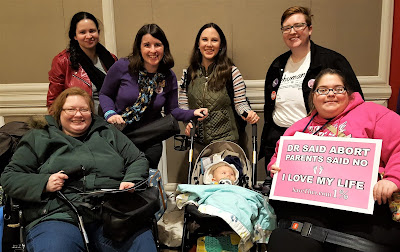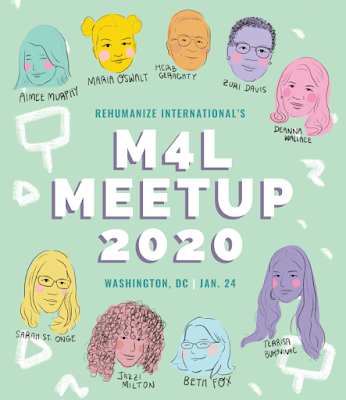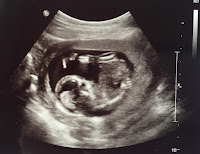Disability Rights and the Pro-Choice Movement: A Match Made in Cognitive Dissonance
 |
| Above: A group of pro-life advocates, including two wheelchair users (Sarah Terzo and Beth Fox). Beth holds a sign reading: “Dr. said abort. Parents said no. I love my life.” |
This article is by guest author Sophie Trist, a university student in Louisiana.
Recently, I came across an op-ed piece in The Hill written by Susan Mizner, director of the ACLU’s Disability Rights Project, and Alexa Kolbi Molinas, a senior attorney with their Reproductive Freedom Project, which condemns HB214, an Ohio bill that would prohibit abortion in cases where the abortion is being sought because the unborn child has been diagnosed with a disability. Mizner and Kolbi Molinas claim that “Such attempts to co-opt the mantle of disability rights to ban abortion are not only hypocritical but also deeply offensive.” They are far from the first writers to attempt to align the goals of the disability rights movement with those of the pro-choice movement. As a blind woman involved in both the pro-life and disability rights movements, this rankles and troubles me. So let’s deconstruct the arguments that try to link these two fundamentally different movements.
One of the most popular arguments, advanced by Mizner and Kolbi Molinas among others, goes something like this: Both the disability rights and the reproductive justice movements are about the right to control one’s own body and determine one’s medical destiny. Proponents of this argument point to America’s long and dark history of eugenics-driven policies, including sterilizing disabled people against their will, performing inhumane medical experiments on them, and restricting their ability to marry and raise children. But in drawing parallels between these tragic events and denying women the right to terminate their pregnancies, pro-choice activists fail to consider two salient points. Firstly, the fetus is not a part of her mother’s body, but a distinct, living human being with unique DNA. Scientists have written about this far more eloquently and extensively than I can here, so I will focus on the second counter-argument.
The purpose of forcible sterilization and other policies influenced by eugenics was to decrease the disabled population, because people with disabilities were seen as inferior, even subhuman. The astronomical number of unborn children with disabilities lost to abortion points to the same dehumanizing mentality that people like Mizner and Kolbi Molinas claim to be working against, the destruction of the weak for the benefit of the strong and able-bodied. No pro-choice commentator seems to have a problem with the fact that in the United States, 67% of unborn children who receive a prenatal diagnosis of Down syndrome are aborted, and in some European countries, the percentage is much higher. If these statistics applied to, say, female babies, I doubt I would hear this ringing silence. While some disabled pro-choice activists speak to the negative stereotypes and perceptions of disability that pervade the medical community and cause many frightened and overwhelmed parents to choose abortion, they still celebrate the killing of unborn children, the most dependent and marginalized members of society, on the altar of autonomy and convenience. When an Oregon woman was urged by six different doctors to abort her twin daughters just because they had Down syndrome, the Internet did not burst into flames with pro-choice outrage. And I’m supposed to believe that these people care about disability rights?
Another popular argument used by activists in the strange intersection of disability rights and pro-choice movements is that bills aimed at protecting unborn children from ableist abortions do not help disabled people overcome the myriad discriminations in healthcare, employment, and housing that we encounter on a daily basis. This argument is utterly ridiculous. No law is capable of solving all of a particular group’s problems. Bills like HB214 are not meant to be panaceas that make the world perfect for people with disabilities. But they do protect our right to life, the fundamental right necessary to enjoy and fight for all other rights.
The pro-life position is based on the belief that every human being has equal dignity regardless of size, level of development, or ability. We reject societal standards that tell us a person’s worth depends on their self-sufficiency. The disability rights movement embraces the social model of disability, which states that society’s standards and stereotypes often place more of a burden on disabled people than our actual disabilities. Like the pro-life movement, disability rights activists assert that someone’s value does not depend on their productivity or independence, but on the humanity which we all share. As Matthew P. Schneider points out, the pro-life and disability rights movements share the same fundamental belief about the inherent worth of all human life, while the pro-choice philosophy relies on the same dehumanization, the same “might makes right” attitude which people with disabilities have been fighting against for centuries.
Let us return briefly to Mizner and Kolbi Molinas. They and others of their ilk accuse pro-lifers of “co-opting the mantle of disability rights” and being hypocritical for protecting disabled people in the womb while supporting cuts to healthcare and other services born people with disabilities and their families depend on. While their attempts to link disability rights and reproductive justice are rife with cognitive dissonance, there is a kernel of truth in this assertion. As pro-lifers, we must wrestle with the uncomfortable fact that many pro-life politicians and leaders act in the interest of preborn disabled people while supporting or tacitly accepting programs that make life more arduous for disabled people and our families. People with disabilities are marginalized and underrepresented in nearly every social justice movement, and the pro-life movement is no exception. I feel compelled to speak out in this post because I have heard remarkably few disabled voices during my time as a pro-life activist. If the pro-life’s narrative of protecting the disabled comes only from those without disabilities and ends at birth, it is easy to understand why pro-choicers believe that we use disabled people only as a means to an end. People with disabilities are often turned off by those who claim to speak for us, because we experience these forms of infantalization so often in our daily lives. The intersection between the pro-life and disability rights movements is deep and fundamental, and I urge my fellow pro-lifers to go beyond the well-meaning but sometimes simplistic narratives our movement has used for decades and make space for people with disabilities to speak for ourselves on a full range of life issues. And I especially urge my fellow disabled pro-lifers to stand up, to let the world know we’re here, that we’re not just pawns on the pro-life game board but activists who take the disability rights framework of valuing every life equally regardless of physical or mental characteristics to its logical conclusion.



Leave a Reply
Want to join the discussion?Feel free to contribute!